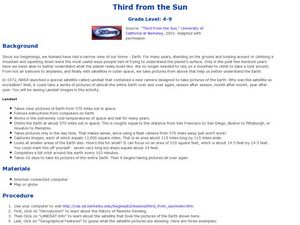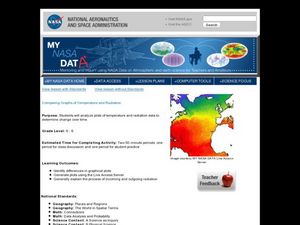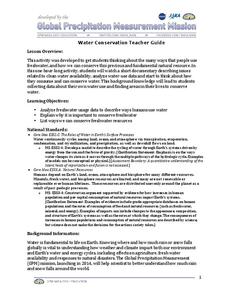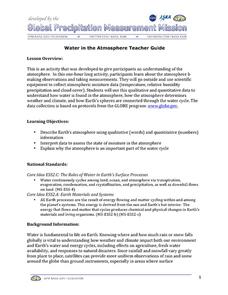Curated OER
Where Are We Going?
Students practice rounding numbers to ones and tens places, multiplying numbers, and working with simple fractions. They study the placement and distances of planets in the Solar System.
Curated OER
Focus on Saturn's Fascinating Features
Students identify and discuss the characteristics of Saturn. They create a book using those characteristics. They also develop diagram to show Saturn and its moons.
Curated OER
Why is the Average Temperature Greater on Venus than on Mercury?
Students examine the reasons why the temperature is higher on Venus than on Mercury. In groups, they analzye both planet's atmospheres and determine the rate of global warming on each. They use the internet to research the planets in...
Curated OER
Titan and the Other Moons of Saturn
Students identify and describe the moons of Saturn. They sort the moons by their characteristics. They write a paragraph describing the moons to end the instructional activity.
Curated OER
Third from the Sun
Students examine images from space. In this third from the Sun instructional activity, students examine images from, Landsat, the satellite launched by NASA in 1972.
Curated OER
Space Presents Problems
Students use the internet to research problems related to space. They complete a questionaire to direct their research before beginning. They create a database of moon and planet characteristics.
Curated OER
Out of This World
Students take a mission to Mars. In this space science lesson, students listen a lecture about space travel to Mars and the planet itself. Students then create timelines of exploration and write poetry about their ideal planet.
Curated OER
All About Titan and the Huygens Probe
Students examine the characterisitics of Saturn's largest moon, Titan. They discuss what they think is on Titan and what the Huygens probe can tell them about the moon. They write a summary about the information they gathered during...
Curated OER
What Do I See Now When I Picture Saturn?
Students complete their study of Saturn and its moons. They reflect in writing what they have gathered from the lessons. They draw pictures and add captions to them. They share their work with the class.
Curated OER
Celebrating Saturn and Cassini
Students use their notes from previous lessons to write a paper on Saturn or Cassini. They share their writings with the class. They discover how everyone has a different learning style.
Curated OER
Comparing Graphs of Temperature and Radiation
Middle schoolers study plots and use a Live Access Server to generate plots. In this temperature lesson students examine the process of incoming and outgoing radiation.
Curated OER
Is Portland, Oregon Experiencing Global Warming?
Students use data to determine if the climate in Portland has changed over the years. In this weather lesson students complete line graphs and study long wave radiation.
Curated OER
Ocean Impacts of an El Nino Event
Students study sea surface height and temperature and other characteristics of an El Nino. In this ocean impacts lesson students examine the factors that influence an El Nino or La Nina.
Chicago Botanic Garden
Carbon, Greenhouse Gases, and Climate
Climate models mathematically represent the interactions of the atmosphere, oceans, land, sun, surface, and ice. Part two in the series of four lessons looks at the role greenhouse gases play in keeping Earth warm and has participants...
NASA
Collecting Electromagnetic Radiation
Astronomy is literally over your head, but this lesson will explain how we study it. Young scientists make telescopes, calculate and compare the light gathering power of lenses, and simulate detection of infared radiation. Materials...
NASA
Exploring Data
Bring the sun to your class! Young scholars analyze actual solar wind data in the second lesson of a five-part series. Their analysis includes speed, temperature, and density data.
NASA
Packing for a L-o-o-o-ng Trip to Mars
Pack just enough to fit. Crews determine what personal items to take with them on a trip to Mars. Each team must decide what to take with them on a two-and-a-half year trip to Mars and whether their items will fit within the allotted...
Curated OER
Amelia the Pigeon: As a Pigeon Flies
Students follow Amelia's adventure on a satellite image. They use measuring and math skills to determine the distance she traveled.
Curated OER
Space Science: Adventure is Waiting
These full-color handouts feature two activities. The first is a reading on comets, meteors, and meteoroids. Your space science learners will examine ten phrases and determine which of the three each characterizes. The second activity...
Curated OER
Gelatin Volcanoes
Students investigate magma flow using gelatin volcano models. In this earth science lesson, students sketch the magma bodies as observed from the top of their model. They explain why magma moves that way.
Curated OER
Connect the Spheres: Earth Systems Interactions
Is everything really connected? Take your class on a walk outside, where they will make observations and write them down on a worksheet. Once they are back in the classroom, learners will work to determine if and how things like birds,...
Curated OER
Water Conservation
Open learners' eyes to the challenge of finding safe drinking water – something we often take for granted in our country. The PowerPoint presentation includes images, graphs, diagrams, and even a video to stimulate discussion on how we...
Curated OER
Water in the Atmosphere
A slide show serves as the backdrop for a instructional activity on the moisture in Earth's atmosphere. Through it, mini meteorologists learn about the attributes of the atmosphere and actually use data-collecting weather tools to make...
Curated OER
Water in the Biosphere
Environmental explorers examine the campus and take note of living organisms. Introduce them to the biosphere and the questions of the day: How much water can be found in the biosphere? A slide show helps you along, and even contains a...

























